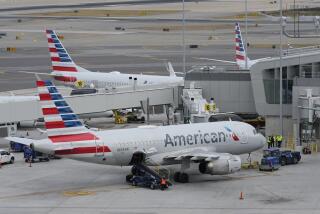Bank overdraft fees creeping up, consumer group says
- Share via
Overdraft charges appear to be creeping higher after a two-year pause that began when the Federal Reserve ordered banks to get customers’ permission before imposing the fees, according to the Consumer Federation of America.
In its annual survey of overdraft fees, the CFA said changes announced by two of the largest domestic banks -- U.S. Bank of Minneapolis and Fifth Third Bank of Cincinnati -- show “rates are again on the rise” from an average of $35 per transaction.
The survey, released Thursday, looked at overdraft fees and practices at the 14 largest U.S. banks. U.S. Bank and Fifth Third were among five that charge “tiered” fees, which vary depending on how many overdrafts are incurred in a twelve-month period.
Later this month, Fifth Third will start charging $37 per overdraft after a $25 fee is assessed for an initial overdraft transaction. This replaces current fees of $33 for the second, third, and fourth overdrafts in a 12-month period.
U.S. Bank will charge $15 for an overdraft transaction that is $15 or less, and $35 for any overdraft over that amount. It currently charges $10 if the overdraft is $20 or less, and $33 per item if the overdraft is more than $20.
Nearly two-thirds of banks pile on second or per-day fees if consumers do not repay overdrafts immediately, the consumer group said. It noted, however, that Fifth Third is dropping its sustained overdraft fee that adds $8 per day after an overdraft remains unpaid for three days.
Fifth Third spokeswoman Stephanie Honans said the study accurately reflects the planned changes at the bank. “Additionally,” she said in an email, “we do not charge an overdraft fee when a customer’s account is overdrawn by $5 or less at the end of our business day.”
In a statement, U.S. Bank said the higher overdraft charges stemmed from a review of all the bank’s deposit fees, which had resulted in the elimination of other fees such as early account closure fees on checking and savings accounts.
“We offer a lower fee for overdrafts caused by small dollar transactions and we don’t charge a fee if the account is overdrawn less than $10,” the bank said. “We have numerous other features that help consumers manage their accounts and avoid fees, including email and mobile alerts and automatic transfer of funds from a savings or other account to avoid encountering a negative balance.”
Only three of the big banks -- Bank of America, Citibank, and HSBC -- do not permit customers to incur overdraft fees on debit-card purchases, the Consumer Federation study said. Citibank and HSBC also prevent overdraft fees triggered at automated teller machines.
The other 11 largest banks encourage customers to opt-in to pay overdraft fees on very small purchases, the survey said.
“Consumers can be charged up to $370 in one day, according to the maximum fee and daily limit fee policies that banks have,” Consumer Federation director of financial services Jean Ann Fox said in a news release.
Calling such assessments “staggering,” she said: “Bank overdraft loans are a form of payday lending.”
RELATED:
Consumer Financial Protection Bureau will investigate overdraft fees
Fed restricts overdraft fees on bank cards
More to Read
Inside the business of entertainment
The Wide Shot brings you news, analysis and insights on everything from streaming wars to production — and what it all means for the future.
You may occasionally receive promotional content from the Los Angeles Times.











